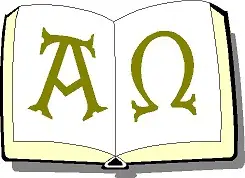Greek Literature
The art of writing was lost to Greece from around 1200 BC, and for nearly 500 years Greece entered an age of illiteracy. But around 750 BC, Grecian traders came into contact with Phoenicians, who used a script called an alphabet.

This alphabet was a wonderful invention, because it allowed them to use just around thirty letters or so to make many different sounds, and it was also much easier to use than pictorial scripts, such as cuneiform. The Greeks adopted this alphabet and added vowels, which made it even more versatile and easy to use. This early version of the alphabet is actually very similar to the alphabet we use today!

At first, the newfound creation of writing was used by the government for the proclamation of laws, so that ordinary people could understand them. Writing was later used to record public decisions and records, and then finally as more and more citizens became literate, or able to read, Greek literature was developed.

 Epic Literature: The greatest literatures of the early Greek period were the Homeric Epics. These were epic poems which described the glorious deeds of great Grecian heroes. Epic poems are long poems, which don’t rhyme, and describe a serious topic, which is usually important to a culture. Homeric Epics described the great deeds of the warriors of Greece, who led the war against Troy, a rival state.
Epic Literature: The greatest literatures of the early Greek period were the Homeric Epics. These were epic poems which described the glorious deeds of great Grecian heroes. Epic poems are long poems, which don’t rhyme, and describe a serious topic, which is usually important to a culture. Homeric Epics described the great deeds of the warriors of Greece, who led the war against Troy, a rival state.
Homer: Even though historians cannot decide whether an actual poet named Homer ever really lived, these stories were the inspiration for much of Greek literature.
The Iliad: The Iliad tells the story of Achilles, who was Greece’s best warrior, who fought in the battle against Troy. After falling in love with a woman from Troy, Achilles withdraws from battle so he can be with his love. He gives his friend Patroclus his armor, who wears it in battle, but is killed by a Trojan named Hector. Achilles then avenges his friend Patroclus by killing Hector, but then he himself is killed when he is struck with an arrow in his heel, his weak spot.
The Odyssey: The Odyssey tells the story of Odysseus, who tries to return home after winning the Trojan War. His journey home is by no means an easy one, and only after many trials and tribulations he finally makes his way home, only find that his house is overrun by hundreds of suitors, who are trying to marry his wife Penelope.
Hesiod: Hesiod was the first major poet after Homer. Around 700 BC he wrote Works and Days, which is a type of farmer’s almanac, which tells the reader when to plow fields and plant crops. He also wrote Theogony, which tells the stories of many different Greek Gods.
Archilochus: About 650 BC, Greek poets began writing more personal stories, and Archilochus was one of these. He was a traveler and mercenary soldier, and wrote bright tales of his actions and personal stories. He was one of the first of the Greek poets to write these types of personal stories, which told real details about his thoughts and feelings.
Sappho: Sappho was the first woman poet from Greece. Much of what she wrote was short love poems. Only bits and pieces remain of most her poetry, but in those pieces she writes many beautiful verses about the pain and longing of being in love.

 Historical Literature: After the wars of the 5th century BC, a new type of writing was developed, called historical literature. Many historians began writing about the past in order to understand what led to war and how people change because of it.
Historical Literature: After the wars of the 5th century BC, a new type of writing was developed, called historical literature. Many historians began writing about the past in order to understand what led to war and how people change because of it.
Herodotus: Called the “Father of History,” Herodotus was the first and greatest of Greek historians. He basically invented the study of history, by asking the question: “why do events happen?” This led him to study the history of Persia and the Near East, and how the history of these countries had impacted Greece.
Thuycidides: Another great Greek historian, who learned his craft from Herodotus, was Thuycidides. Even though he didn’t live to finish his greatest work, a history of the Peloponnesian Wars, his histories remain because of the great detail and the analysis of facts that he included in his work.

Hellenistic Greek Literature: In the age of Hellenistic Greece, after the conquests of Alexander the Great, Greek culture spread to most of the known European World, North Africa, and Persia. One of the places dominated by Greek culture was Egypt.
The Library of Alexandria: The kings of Egypt created a giant library, the Library of Alexandria, where they stored all of the great works of Greek poets, historians, philosophers, scientists, and other writers. This library was so big that it probably contained over a half a million papyrus scrolls! It was a symbol of the growing scholarship of the Late Greek period, because it was an area where thinkers and writers could perform literary, historical, and scientific studies.
The Burning of the Library: We will never know exactly what texts or how many pieces of literature were actually in the library of Alexandria, because in 48 BC, the library was burned down in a siege by the Greek emperor. More than 40,000 works of Greek philosophy, literature, history, and science were sadly burnt and lost to history for all time.

The development of the Greek alphabet and the many wonderful works of Greek writers helped to create the literary tradition that people still enjoy. Many Greek poems and histories are still read in schools and for enjoyment today.



